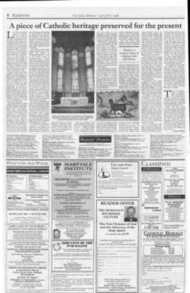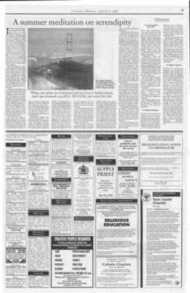Page 1, 24th July 1998
Page 1

Report an error
Noticed an error on this page?If you've noticed an error in this article please click here to report it.
Tags
Share
Related articles
Local Unity Urged After Lambeth Vote
Christian Invitation
Cardinal Raises Stakes In Quest For Church Unity
Meeting Rekindles Unity Hopes
Pope Calls For Unity In Europe
Cardinal Cassidy: Are we ready for ARCIC III?
There is an 'insidious' threat to unity, he warns
EXCLUSIVE
BY LUKE COPPEN:
THE HEAD of the Vatican's Christian Unity department said this week that Catholic discussions with the Church of England must enter a new phase in the next millennium, but he warned that dialogue between the two Churches must attack the causes of disunity and not just its symptoms.
Speaking to the Catholic Herald on Iliesday, Cardinal Edward Idris Cassidy, who is in Britain for the 13th Lambeth Conference, also questioned the timing of Cardinal Ratzinger's recent statement reaffirtriing the nullity of Anglican orders. He is first highranking prelate to express reservations about Cardinal Ratzinger's choice of the 1896 papal decree Apostolicae Curae as an illustration of a definitive
Church teaching. Cardinal Cassidy, the Australian-born President of the Pontifical Council for Promoting Christian Unity said he understood that divisions over the Eucharist were "a constant pain" for anyone in the ecumenical movement.
'We look at the pain as being in the fact of not being able to receive the Eucharist," Cardinal Cassidy said. "But the pain really is much deeper than that. It's in the fact that we are not fully in communion so as to be able to share the Eucharist.
"It's like someone who has a physical pain and thinks, 'If I have an aspirin I'll get rid of it.' If it's a simple pain then an aspirin can solve it. But if its
something deeper, the aspirin will only put the pain out for a little while and then it will come hack. We have to attack the source of the pain. And the source of the pain as far as not being able to share the Eucharist is those problems that don't allow us to be in communion."
He said the dialogue faced new obstacles, "that appear at least humanly speaking to be insurmountable", such as v..omen's ordination. But he had no objection to a third AnglicanRoman Catholic International Commission to consider pressing theological differences. "Do we go ahead straightaway with an ARCIC 3? There's no idea on our part of not having continuous dialogue. It's just a case of what's the most opportune and practical way of moving ahead in the dialogue," he said.
The Cardinal is discussing a plan with the Archbishop of Canterbury to call bishops from across the Anglican and Catholic world to a millennium meeting to discuss ways of moving the dialogue forward. Last week Dr Carey said the "bones" of any new millennium dialogue would be in the form of a new commission. "We expect ARCIC III," he said.
Cardinal Cassidy also commented that Cardinal Joseph Ratzinger's recent restatement of the invalidity of Anglican Orders was prepared "without any idea" that it would create problems for the ecumenical movement. "That was not the intention," Cardinal Cassidy said. "Perhaps, on reflection, one might not have chosen it. It was not meant to in anyway as a negative comment on our dialogue."
On Monday night, Cardinal Cassidy gave the homily at Lambeth Conference's ecumenical vespers, to which the Holy Father sent a greeting. He told the 735 assembled bishops from the 37 provinces of the Anglican Communion that there were new risks to unity. He exhorted them not to compromise the Gospel by lowering moral standards a reference to the Conference debate on homosexuality, which is expected to divide the bishops.
He called this question an "insidious" threat, saying: "The commitment to unity is relativised if diversity and differences that cannot be reconciled with the Gospel are at the same time being embraced and exalted... when pluralism in the Church comes to be regarded as a kind of 'post-modern beatitude'."
• Editorial comment — Please turn to Page Four
blog comments powered by Disqus











